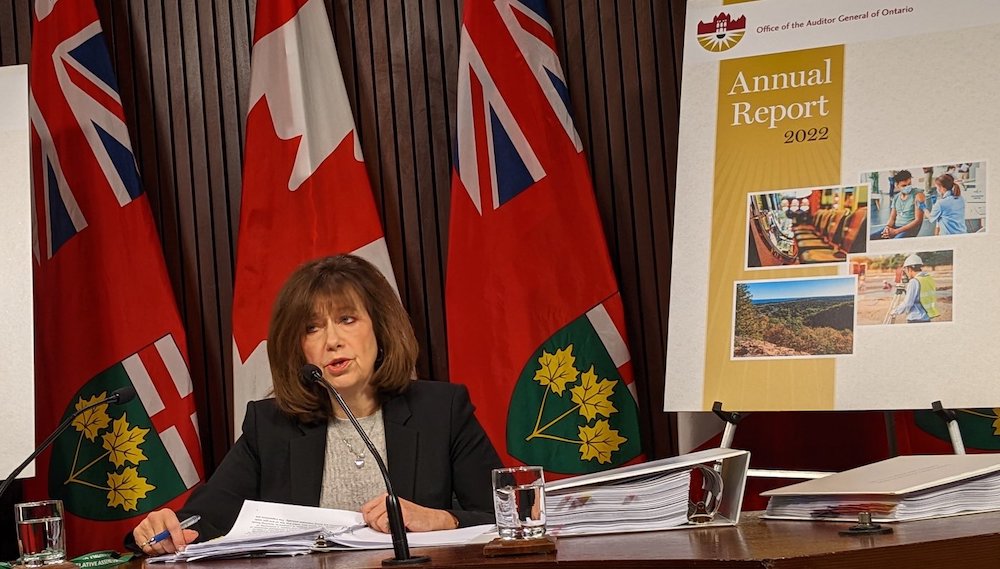
Ontario has no plan to deal with growing urban flooding: auditor general
December 2, 2022
By Morgan Sharp, Local Journalism Initiative Reporter
 Ontario auditor general Bonnie Lysyk speaks to reporters after the release of her office's 2022 annual report. Photo by Morgan Sharp.
Ontario auditor general Bonnie Lysyk speaks to reporters after the release of her office's 2022 annual report. Photo by Morgan Sharp. Ontario still has no co-ordinated plan to deal with increasingly intense flooding and its effects on urban areas, the province’s auditor general said in a wide-ranging report on the Ford government’s fiscal record.
The province is failing to prepare for urban floods, which are becoming more common and more intense with climate change, while the environmental legislation it does put forward is lacking in funding to make it happen, auditor general Bonnie Lysyk said.
“In the area of environment, what we see is there’s expectations that the money is not there to achieve and to meet,” she said Wednesday at Queen’s Park after delivering her office’s 1,083-page report to the legislature.
“Now, that is a choice,” she said. “Funding and where money is allocated is definitely a government choice, but it just needs to be transparent to people why those choices are being made as well.”
The report details the spending habits of a government that has habitually tucked away billions in contingency funds. This means little oversight is possible into how that money is ultimately spent, the report notes.
Lysyk said her office’s executive team had not yet discussed investigating the government’s Greenbelt dealings, as requested by the NDP after Ontario said earlier this month it planned to remove 15 parcels of land totalling about 7,400 acres from the Greenbelt protected area in a move set to benefit a string of developers.
The annual report detailed examples of waste and mismanagement in chapters on flooding, conservation of the Niagara Escarpment, post-secondary education, the procurement and delivery of COVID-19 vaccines and personal protective equipment, environmental hazards, invasive species, electricity, auto insurance and more.
The auditor general’s office has itself subsumed several specific watchdog offices since Premier Doug Ford’s government closed them, including the former environmental commissioner’s office, which was axed late in 2018.
The report also said the government has not counted how many high-risk oil and gas wells have been plugged or need to be, nor fixed one leaking oil since 2018 or two more at high risk of leaking gas.
This is despite a gas explosion in the centre of the Ontario town of Wheatley in August 2021, which the auditor general’s office was told was partly due to deteriorating materials used to plug a well in the 1960s.
Meanwhile, armed with four separate recent reports listing the specific actions required to reduce Ontario’s urban flood risk, the province “has never clarified provincial roles… with the result that gaps in responsibility persist and actions and commitments have never been implemented,” it said.
As of 2015, southern Ontario had lost nearly three-quarters of its original wetlands, reducing natural flood control in urban areas, the auditor general’s report noted.
A lack of clarity in the building code means many new homebuyers are not protected from sewer backups, it said, while most municipalities can’t map their urban flood risk areas or access reliable sources of cash to finance shortfalls in stormwater infrastructure funding.
They get mixed messages on using projected climate change data and so many continue to rely on historical data, it said, while the lack of a standard way to assess and report on stormwater infrastructure and flood resiliency impairs long-term planning and funding decisions.
The ministries of the environment and natural resources have also failed to educate the public about flood risks and what they can do to mitigate them, the auditor general’s report said.
Installing a backwater valve would reduce the risk that sewage backup floods someone’s basement, for example. The government has committed in its 2018 environment plan and since then to work with realtors and insurers to raise awareness but has so far not followed through.
Mike Schreiner, the leader of Ontario’s Greens and their only MPP, said the lack of planning was reckless and irresponsible in the face of significant financial and economic risks as well as risks to people’s livelihoods, property and lives from a changing climate.
“The fact that this government doesn’t even have a plan, it has been clearly pointed out by the auditor general on more than one occasion that they don’t have a plan, and the fact that they’re dragging their feet on delivering a plan, to me, is reckless, it’s risky and it’s completely irresponsible,” he said.
A record-breaking rainfall in Toronto in 2013 caused insured damage of $1 billion from a mix of urban and river flooding, making it the province’s costliest disaster. Floods causing at least $80 million in insured losses have also hit Thunder Bay, Hamilton, Burlington and Windsor and Tecumseh in the past decade.
It will cost $66 billion between now and the end of the century to help Ontario’s public buildings deal with extreme rainfall, extreme heat and freeze-thaw cycles, the Financial Accountability Office estimated in 2021, with rainfall counted as the biggest of the three climate change-related challenges.
The auditor general also said the province’s COVID-19 vaccination system favoured those with access to better technology, duplicated functions across different systems and failed to get enough vaccines to hot spot areas.
Morgan Sharp is a Local Journalism Initiative Reporter for Canada’s National Observer.
Print this page